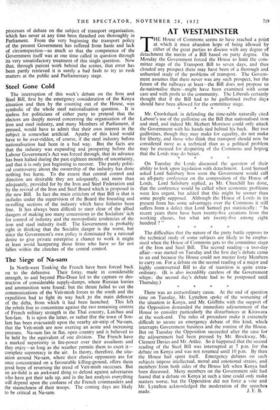Steel Gone Cold The interruption of this week's debate on
the Iron and Steel Bill, first by the emergency consideration of the Kenya situation and then by the counting out of the House, was symbolic of the whole steel nationalisation question. It is useless for politicians of either party to pretend that the electors are deeply moved concerning the organisation of the iron and steel industry, and many Members of Parliament, if pressed, would have to admit that their own interest in the subject is somewhat artificial. Apathy of this kind would have to be over-ridden, of course, if the steel industry before nationalisation had been in a bad way. But the facts are that the industry was expanding and prospering before the Labour Government's Act was forced through, that its advance has been halted during the past eighteen months of uncertainty, and that it is only just beginning to recover. The purely politi- cal controversy about the ownership of the industry has done nothing but harm. To the extent that central control and direction are desirable they are adequately, and more than adequately, provided for by the Iron and Steel Federation and by the revival of the Iron and Steel Board which is proposed in the new Bill. In fact the main criticism of that Bill is that it includes under the supervision of the Board the founding and re-rolling sections of the industry which have hitherto been free. It has always been difficult to steer clear of the allied dangers of making too many concessions to the Socialists' itch for control of industry and the monopolistic tendencies of the iron and steel industry itself. The Government is probably right in thinking that the Socialist danger is the worst, but since the Government's own policy is dominated by a rational desire to give private enterprise a chance to work it might at least avoid hampering those firms who have so far not fallen within the clutches of the central control.


































 Previous page
Previous page